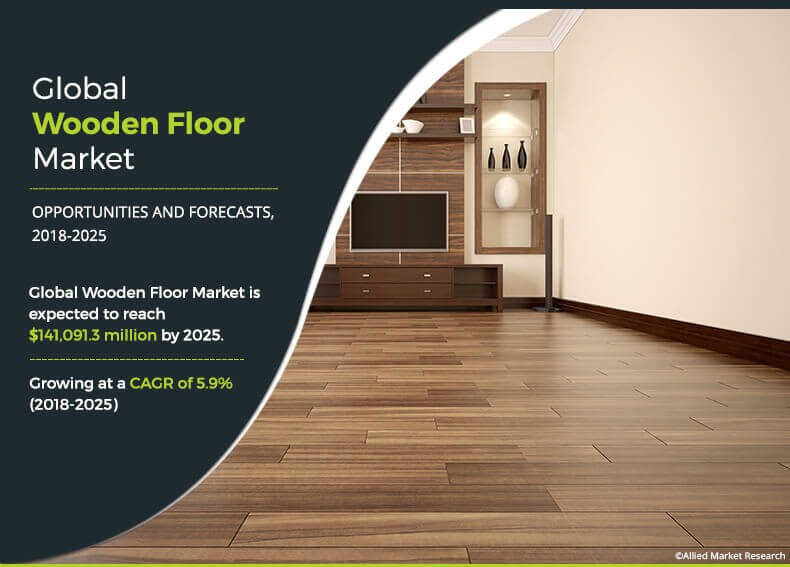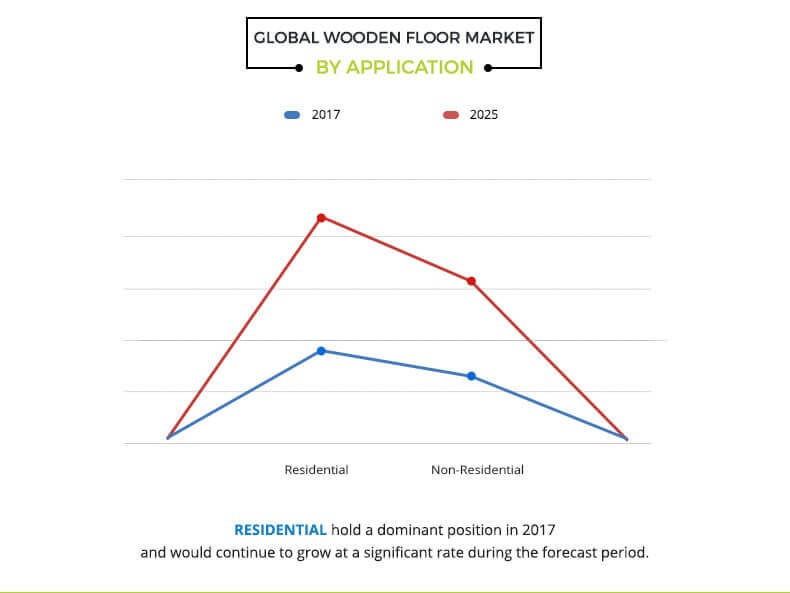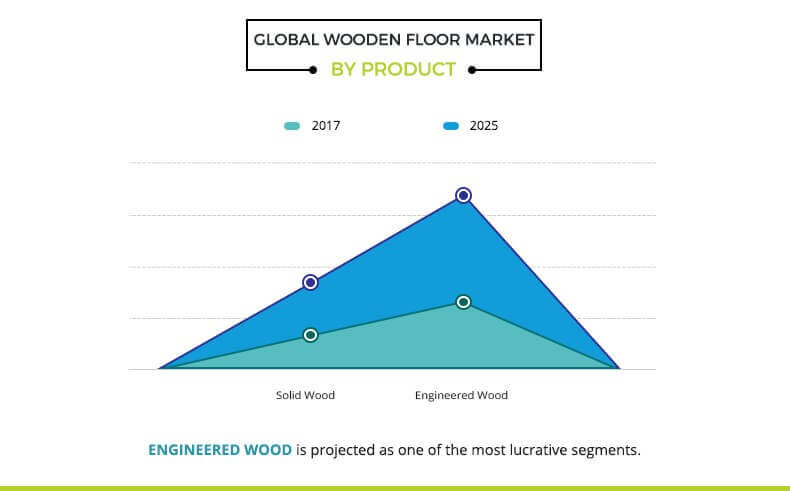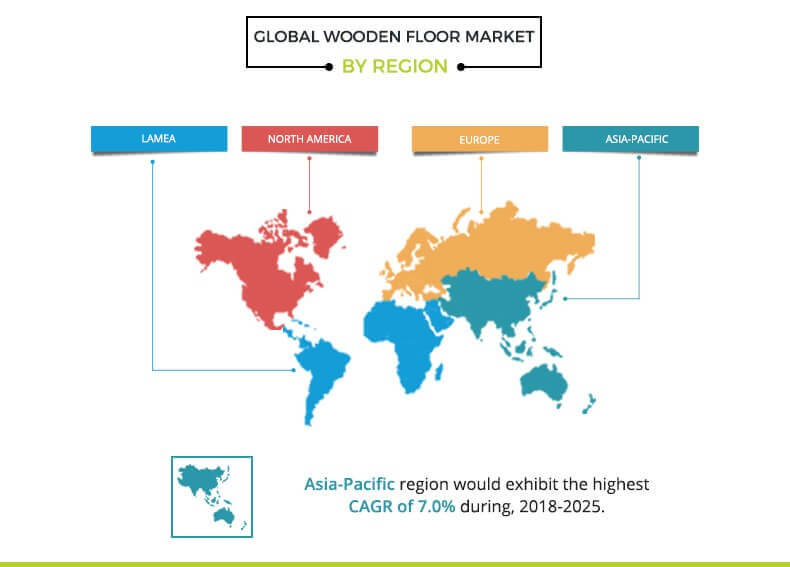Wooden Floor Market Overview
The global wooden floor market size was $90,638.1 million in 2017, and is projected to reach $141,091.3 million by 2025, growing at a CAGR of 5.9%, and in terms of volume, the market is expected to grow at a CAGR of 4.7% by 2025.
The flooring constitutes horizontal element for buildings and infrastructure architecture that help manage the landscape attributes for visual appeal, pedestrian movement, and provide support to other infrastructure elements.
Factors, such as new construction, renovation, and retrofitting activities for buildings as well as infrastructure influence the market growth, and are expected to drive the wooden floor market during the forecast period. However, increased emphasis on use of green and eco-friendly material, such as wood, and fluctuation in foreign currencies affect profit margins, which are estimated to impede the global wooden floor market. Moreover, key market players adopt various strategies, such as business expansion and acquisition, to strengthen their market presence, which boost the growth of the market. For instance, in April 2016, Shaw Industries Group, Inc., expanded its hardwood flooring manufacturing facility in South Pittsburg, Tn., to meet the growth in demand for its engineered hardwood flooring products.
Segment Overview
The Global Wooden Floor Market is segmented based on product, application, and region. Based on product, the market is fragmented into engineered wood and solid wood. The engineered wood segment is anticipated to dominate the global market throughout the study period. Based on application, the market is categorized into residential, and non-residential. The residential segment is projected to dominate the global market in future.
By Product
By product, the market is segmented into engineered wood and solid wood. Among these, the engineered wood segment is expected to grow at a significant growth rate during the forecast period, owing to manufacturing of engineered wood products that require less energy in comparison to that of other flooring materials. Also, it results in few greenhouse gases and other air pollution emissions, thereby, making engineered wood the preferred choice for sustainable designs of flooring.
By Region
The market is analyzed across North America, Europe, Asia-Pacific, and LAMEA. Among these, Europe holds a significant share in the global market, and Asia-Pacific is projected to register the highest CAGR.
Key Benefits
- The study provides an in-depth analysis of the global wooden floor market along with the current trends and estimations to elucidate the imminent investment pockets.
- Information about the key drivers, restraints, and opportunities and their impact analyses on the market is included in the study.
- Porters five forces analysis illustrates the potency of the buyers and suppliers operating in the industry.
- The quantitative analysis of the global market from 2017 to 2025 is provided to determine the market potential.
Wooden Floor Market Report Highlights
| Aspects | Details |
| By PRODUCT |
|
| By APPLICATION |
|
| By Region |
|
| Key Market Players | BRUMARK, MANNINGTON MILLS, INC., MOHAWK INDUSTRIES, INC., TARKETT S.A., KÄHRS HOLDING AB (PUBL), BORAL LIMITED, NATURE HOME HOLDING COMPANY LIMITED, BEAULIEU INTERNATIONAL GROUP N.V., BERKSHIRE HATHAWAY INC. (SHAW INDUSTRIES GROUP, INC.), ARMSTRONG FLOORING, INC. |
Analyst Review
The demand for wooden floor is on the rise across the globe. The outdoor entertainment area, such as patio, porches, and backyards has gained popularity in the past few years, owing to its semi-natural ambience and functional utility for small gatherings. As a result, millennials are increasingly opting for dedicated outdoor entertainment areas in their residences. It drives the demand for wooden floor in residential buildings, such as row houses, bungalows, townhouses, condos. In addition, the growth in number of DIY (do-it-yourself) solutions have also fueled the number of home renovations and retrofitting flooring projects among individuals. Thus, driving the market growth of the wooden floor market during the forecast period.
The market players have adopted key developmental strategies, such as product launch to fuel the growth of the wooden floor market. They have introduced advanced designs to boost the demand for wooden floors. For instance, in March 2016, Armstrong Flooring expanded its portfolio of hardwood flooring for commercial spaces. It includes variety of species, shades, and design themes that can be used to complement or contrast a wide range of flooring.
Based on product, the global wooden floor industry is categorized into engineered wood and solid wood. The engineered wood flooring segment is projected to remain dominant throughout the analysis period, owing to their low cost of production, durability, flexible design, and easy installation. Further, the large scope of application for wood flooring in commercial spaces, such as offices, buildings, malls, airports, educational buildings, large public spaces, and others, have positively impacted the wooden floor market.
Loading Table Of Content...







